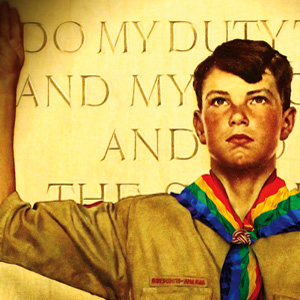On May 23, more than 1,400 delegates who make up the Boy Scouts of America’s National Council will vote whether to end one type of discrimination based on sexual orientation—but leave another in place. The proposed resolution, which will be discussed at the palatial and fittingly named Gaylord Texan resort in Grapevine, Texas, would officially open up membership to gay scouts under the age of 18.
In a letter sent last month to delegates, Boy Scouts of America’s national president, Wayne Perry, cited the evolving attitudes toward gays and lesbians among scout parents under 50. “We believe the BSA can no longer sacrifice its mission, or the youth served by the movement, by allowing the organization to be consumed by a single, controversial and unresolved societal issue,” Perry wrote.
While the landmark resolution, if approved, would open scouting’s doors to gay boys, the organization would continue to bar gay and lesbian adults from serving as scoutmasters. Critics on both sides of the issue see the resolution as a baby-splitting attempt at compromise that’s destined to fail.
GLAAD (the Gay and Lesbian Alliance Against Defamation) has actively campaigned for a complete repeal of the BSA’s ban on gay and lesbian participation. Following Perry’s April 19 letter, GLAAD Vice President of Communications Rich Ferraro issued a scathing statement admonishing BSA for choosing to maintain the gay adult ban.
“Yet again, the Boy Scouts of America has failed its members, corporate sponsors, donors and the millions of Americans who agree that the time to end discrimination throughout scouting is now,” Ferraro said. “By refusing to consider an end to its ban on gay and lesbian parents, the Boy Scouts have missed an opportunity to exercise leadership and usher the organization back to relevancy.”
As it stands today, BSA policy prohibits what it calls “sexual advocacy” of all kinds. Simply put, that means discussions about sex and sexuality are absent from the scouting curriculum altogether. Margaret Caldwell, director of field services for the San Jose-based Silicon Valley Monterey Bay Boy Scouts Council, which serves 23,000 scouts in Santa Clara County and three neighboring counties, says that “sexuality is not a part of our program.
“We’re not here to talk about a subject matter that we believe belongs in the home or in the education system or however that works for individual families,” Caldwell says.
This stance has led to an atmosphere in scouting remarkably similar to the former tenets of “Don’t Ask, Don’t Tell” in the U.S. military. Ironically, many of those who remain adamantly opposed to any kind of institutionalized acceptance of gays use DADT to justify their position. John Stemberger, founder of onmyhonor.net, an online hub dedicated to opposing “open homosexuality in the Scouts,” says that accepting openly gay members into the BSA’s ranks would be tantamount to endorsing the entirety of what he refers to as the “gay agenda.”
“Being gay is not who you are, being gay is a political movement,” Stemberger says. While he admits that gay scouts and scout leaders are undoubtedly already involved in scouting programs all over the country, Stemberger believes that the BSA’s current policies prevent them from “hijacking” the organization’s national agendas.
“The thing about it is, they’re discreet, they’re personal, they’re appropriate, they’re not acting out; they’re not engaging in gay activism, and that’s what this is all about,” Stemberger says. “Membership in full is not good enough for them, and full participation isn’t good enough. What gay rights activists want is to promote the gay agenda in scouting.”
Two other big players inform the discussion: god and money.
Approximately 70 percent of all scouting units across the country are chartered by faith-based organizations. Stemberger is convinced that the resolution, if it goes through, would force churches to sever their ties with the BSA.
“There’s just no way that the [Latter-day Saints] Church, the Baptist Church, the Catholics and even some Methodists are going to allow that for a chartered unit within their church,” he says. “And, so, I predict that there will be a mass exodus of the heart and soul of scouting, parents, scouts and scout masters.”
Stemberger’s speculation about the Church of Jesus Christ of Latter Day Saints (LDS), however, is unfounded. The single largest charter of Boy Scout troops in the country, the Mormon Church announced on April 25 that it would support the BSA’s resolution.
Zach Wahls, an eagle scout and product of a two-mother household, is familiar with Stemberger’s positions. In the past, the two have debated one another on CNN. Wahls helped found Scouts for Equality, an advocacy group promoting policies of non-discrimination and tolerance within the BSA. ÊHe says that Stemberger and others’ opposition to the proposed resolution can be traced to anxiety and ignorance.
“What ‘out and proud’ means is showing people the picture of your significant other in your wallet,” Wahls says. “It means having your partner there at your son’s eagle scout ceremony. That’s what it means to be an ‘out’ gay person in the 21st century.”
Wahls says that the BSA’s resolution is a step in the right direction, but it sends a particularly confusing message to scouts about their place in the organization after their 18th birthday.
“This is the first time in decades that the Boy Scouts has ever considered lifting this policy in any respect, and we have to acknowledge that,” Wahls says. “But we also have to understand that somehow telling scouts that the day you turn 18, if you are a gay eagle scout you are no longer qualified to be a boy scout, that is just as damaging a message as telling that kid when he’s in the program he’s not good enough to be a scout.” Interesting to note, Wahls and Stemberger agree on this point.
The San Francisco Bay Area Boy Scout Council, Pacific Skyline Council, Piedmont Council, Marin Council and Golden Empire Council all refused comment on the proposed resolution or didn’t return repeated requests for interviews. But some Democratic state legislators suffer no indecisiveness.
Senate Bill 323, also known as the “Youth Equality Act,” would deny tax-exempt status to the Boy Scouts and other youth groups that discriminate on the basis of sexual orientation, gender identity, nationality or race. The bill has been winding its way through the Senate Finance and Appropriation Committees since it was introduced in February, and it could be headed back to the Senate floor as early as May 2.
Not every local BSA chapter is sitting on the sidelines, though.
Redwood Empire council president Herb Williams is one of the 1,400 delegates heading to Gaylord to cast a vote on May 23. Though he chose his words carefully, he did say the proposed resolution is far from complete.
“I’m sorry, it’s only half-baked,” he says, “but it’s still a positive step forward.” That being said, Williams would not divulge how his council intends to vote.

 Billy Elliot the Musical
Billy Elliot the Musical  Robert “The Ghost” Guerrero fights Floyd Mayweather this Saturday
Robert “The Ghost” Guerrero fights Floyd Mayweather this Saturday 

